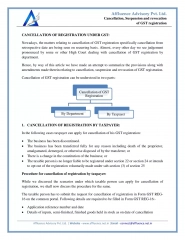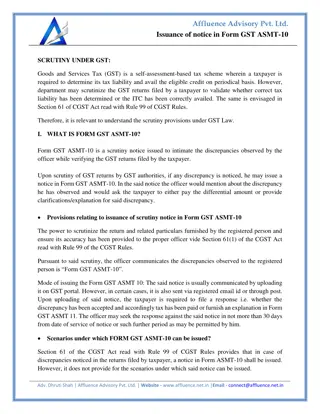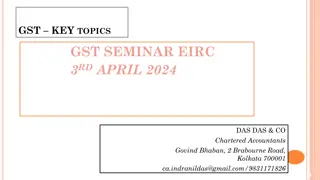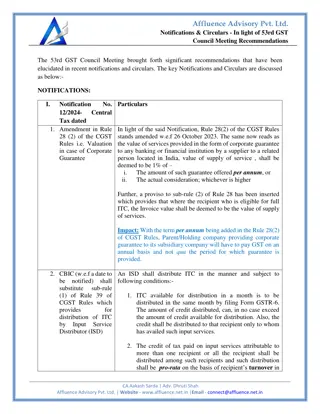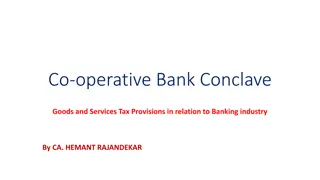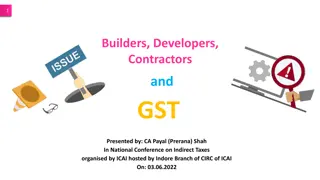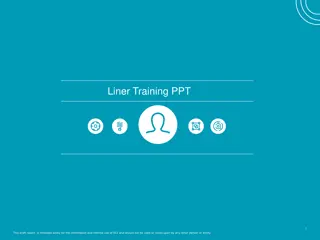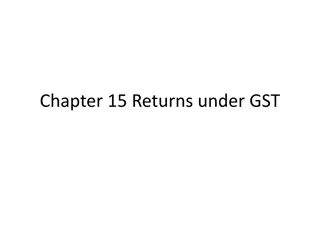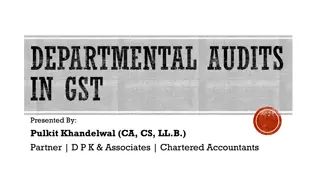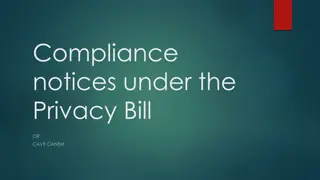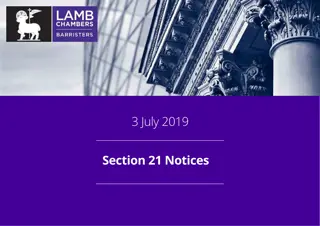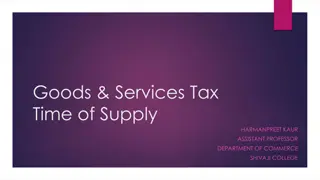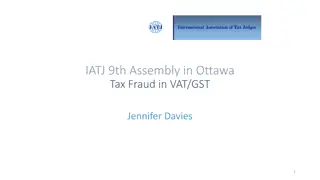Understanding GST Notices: Reasons, Types, and Mode of Delivery
Explore the world of GST notices, including their definition, reasons for issuance, types of notices such as show cause notice and scrutiny notice, common defaults that lead to notices, and the methods used for delivering notices to taxpayers. Gain insight into the important concept of profiteering and the consequences of non-compliance with GST regulations.
Download Presentation

Please find below an Image/Link to download the presentation.
The content on the website is provided AS IS for your information and personal use only. It may not be sold, licensed, or shared on other websites without obtaining consent from the author. Download presentation by click this link. If you encounter any issues during the download, it is possible that the publisher has removed the file from their server.
E N D
Presentation Transcript
BY CA KUSUM GANDHI
WHAT IS NOTICE ?
As per the Cambridge English Dictionary, Notice means - to see or become conscious of something - to bring someone to the attention of - information or a warning given about something that is going to happen in near future . Notices under GST are communications by the GST Authorities. GST notices sent as a word of caution for any defaults noticed by authorities for GST Compliance/to collect more info from taxpayers. GST notices are called by different names such as SCN / Scrutiny Notice/ Demand notice. Purpose of notice/ intensity of default committed /action required from taxpayer determine what a GST notice will be called.
REASONS FOR NOTICES
Non-payment of GST liability / short-payment of tax with/ without intent to defraud: show cause notice GST Refund wrongly made with / without intent to defraud: show cause notice ITC wrongly availed / utilised. Where a business liable but failed to obtain GST registration & not discharged tax & other liabilities Inconsistencies in reporting of Exports in GSTR-1 with information available on ICEGATE.
Inconsistent declaration in GSTR-1 & e-way bill Mismatch in details reported between GSTR-1 & GSTR-3B: scrutiny notice Difference in ITC claim in GSTR-3B vis-a-vis GSTR-2A/2B Delay in filing of GSTR-1 & GSTR-3B consecutively for more than six months
For furnishing any information related to records to be maintained by a taxpayer Non-reduction of prices due to reduced GST Rates with effect from the date notified by CBIC. Thereby, a default is committed by taxpayer (seller) for non-passing of the benefit of reduced prices (or GST rates) to the ultimate consumers. The practice is known as profiteering. Conduct of audit by tax authorities
MODE OF SENDING NOTICES
Hand-delivering the notice directly / by a messenger by a courier to the taxpayer / his representative. By registered post /a speed post / a courier with an acknowledgement- addressed to the last known place of the business of the taxpayer. Communication to the email address
Making it available on the GST portal after logging in. By publication in a regional newspaper being circulated in the locality- that of the taxpayer based on the last known residential address. If none of the above means is used, then by affixing it in some prominent place at his last known place of business / residence. If this is not found as reasonable by the tax authorities, they can affix a copy on the notice board of the office of the concerned officer / authority as a last resort.
TYPES OF GST NOTICES
S. N o. 1 Notice form and Rules REG-03 Rule 9(2) Description Action Response time limit Consequences of not responding Additional information /clarification/ documents relating to application for registration /amendment /cancellation of registration Form REG-04 with clarification, information and document Within 7 working days from the date of receipt the notice Rejection of the application (inform the applicant electronically in Form REG-05 2 REG-17 Rule 22(1) SCN for cancellation of GST registration Reply, in form REG-18 Within 7 working days from the date of service of notice Cancellation of GST registration in form REG-19 3 REG-23 Rule 23(3) SCN for rejection of application for revocation of cancellation of registration. Reply in form REG-24 Within 7working days from the date of service of notice Cancellation of GST Registration will be revoked
S. No. Notice form and section GSTR-3A Rule 68 Description Action Response time limit Consequences 4 Default notice to non- filers of GST returns in GSTR-1 / GSTR-3B / GSTR-4 / GSTR-8 File GST Returns along with late fees and interest 15 days from the date of receiving notice Best judgement basis assessment by Dept. including penalty u/s 122 5 RFD-08 Rule 92(3) SCN on rejection of GST refund Reply in form RFD-09 Within 15 days of receipt of notice REJECTION order in form RFD-06 6 ASMT-02 Rule 98(2) Additional Information for provisional assessment under GST Reply in form ASMT-03 with documents Within 15 days of service of notice Application may be rejected
S. No. Notice form and section Description Action Response time limit Consequences 7 ASMT-06 Rule 98(5) Additional information for final assessment under GST form ASMT-03 Within 15 days of the service of the notice Order, in form ASMT-07 for amount refundable /payable 8 ASMT-10 Rule 99(1) Notice for intimating discrepancies in the GST return after scrutiny Reply in form ASMT-11 giving reasons for discrepancies Within the time prescribed in the SCN or 30 days from the date of service of notice Within 15 days of the notice Ex-parte assessment 9 ASMT-14 Rule 100(2) Assessment u/s 63 (best judgement assessment) Appearance before the concerned authority Assessment order in form ASMT-15
S. No. Notice form and section Description Action Response time limit Consequences 10 ADT-01 Rule 101(2) Notice for conducting Audit u/s 65 Attend in person and/ or produce records Within the time prescribed in the notice Deemed that the taxpayer doesn t possess necessary records and proceedings shall be initiated accordingly 11 DRC-01 Rule 100(2) & Rule 142(1)(a) SCN for demand of tax Reply, in form Within 30 days of the notice Order passed with available details DRC-06. Payment in form DRC-03 12 DRC 10 Rule144(2) Notice for Auction of Goods u/s 79(1)(b) Pay outstanding demand as per form DRC-09 As specified in the notice Proceed with auction and sale
S. No. Notice form and section Description Action Response time limit Consequences 13 DRC-11 Rule 144(5) & Rule 147(12) Notice to the successful bidder Pay the bid amount Within 15 days from the date of auction Re-auction 14 DRC-13 Rule 145(1) Notice to a third person u/s 79(1)(c) Deposit the amount specified in the notice & reply in form DRC-14 Not Applicable Deemed to be a defaulter 15 DRC-16 Rule 147(1)& Rule 151(1) Notice for attachment & sale of immovable/movable property/shares u/s 79 Refrain from transferring/ creating charge on the assets Not applicable Prosecution and penalties
IMPORTANT POINTS TO CONSIDER Understand the Business & issue involved Explain how the business operates Facts should be simple & understandable Confirm the facts along with documentary evidence Understand the relevant Section, Rules during the disputed period & its applicability to the facts of the case Rebut all the allegations made in SCN Rules / Circulars beyond the Act are invalid
POINTS TO CONSIDER WHILE REPLYING Verify, whether it is in the prescribed Form. Find out whether the alleged default is committed by the recipient & notice is self explanatory. If it is not so, write to issuing authority, to clarify. Do not assume anything & do not reply hurriedly. Facts of the case are very important & should be written down first, before writing a reply. Do not simply cite the case law, but write the applicable facts & applicable ratio of the case cited. What lastly you expect the authority to do, shall be mentioned, instead of merely mentioning that the Notice is bad in law.
Whether the notice is issued by the jurisdictional proper officer? Central Tax Officers Jurisdiction Division of Tax payers between Center and State Authority who initiated the action is empowered to complete the entire process of investigation, issuance of SCN, adjudication, recovery etc Cross Empowerment not allowed State Tax Officers Jurisdiction Intelligence-based enforcement action can be taken by State or Central Tax officers
Cir. No. 122/41/2019 &128/47/2019-GST dtd 23-12-2019 DIN is mandatory for all the communications with the taxpayers, including e-mail communication. Any communication made without DIN shall be invalid In certain exceptional cases, the notices/letters can be issued without quoting DIN Can be verified at www.cbic.gov.in Notice shall be issued within the time limits prescribed in Sec 73/74/76
Rule 88C Manner of dealing with difference in liability reported in statement of outward supplies & reported in return Tax payable as per outward supplies furnished in FORM GSTR-1 / using the IFF exceeds the amount of tax payable in the return for that period in FORM GSTR-3B, by such amount & such percentage, as recommended by the Council, the said registered person shall be intimated of such difference in Part A of FORM GST DRC-01B, electronically on the common portal, & a copy of such intimation sent to his e-mail address.
Contd..Rule 88C Registered person either- (a) pay the amount of differential tax liability, as specified in Part A of FORM GST DRC-01B, fully or partially, along with interest u/s 50, through FORM GST DRC-03 & furnish the details in Part B of FORM GST DRC-01B electronically on the common portal; or (b) furnish a reply electronically on the common portal, incorporating reasons in respect of that part of the differential tax liability that has remained unpaid, in Part B of FORM GST DRC-01B Where any amount (1) remains unpaid within the period specified & where no explanation/ reason furnished by the registered person in default/ where the explanation / reason furnished by such person not found to be acceptable by the proper officer, the said amount shall be recoverable as per section 79.
Supplier filed GSTR-1 as well as return in GSTR-3B for a tax period, but failed to report a particular supply in GSTR-1, due to which the said supply does not get reflected in GSTR-2A of recipient. Supplier failed to file GSTR-1 for a tax period but filed return in GSTR-3B for said tax period, due to which supplies made in said tax period do not get reflected in GSTR-2A of recipients. Proper officer shall first seek details from registered person regarding all the invoices on which ITC has been availed by registered person in his GSTR 3B but which are not reflecting in his GSTR 2A. He shall then ascertain fulfilment of the conditions of Sec, 16 of CGST Act in respect of ITC availed on such invoices by said registered person Supplies made to a registered person & invoice is issued as per Rule 46 of CGST Rules containing GSTIN of recipient, but supplier wrongly reported said supply as B2C supply, instead of B2B supply, in FORM GSTR-1, due to which said supply does not get reflected in FORM GSTR-2A of said registered person. Supplier filed FORM GSTR-1 as well as return in FORM GSTR-3B for a tax period, but he has declared the supply with wrong GSTIN of the recipient in FORM GSTR-1.

 undefined
undefined





